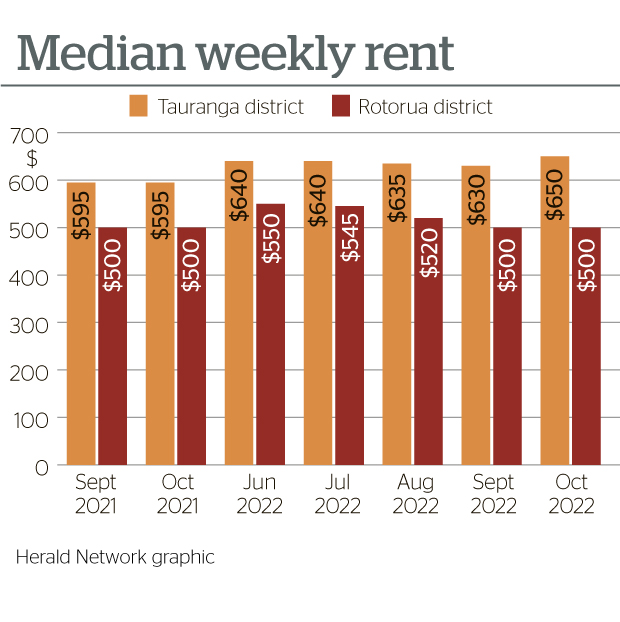Rotorua renter Abigail Hargreaves fears she will end up back into emergency housing when she loses her rented sleepout, saying she will have “nowhere to go”.
The 29-year-old said she had moved six times in two years due to “ridiculous” rental prices in Rotorua. This included a stint in an emergency housing motel.
Now the sickness beneficiary and cat owner, who needs to move by December 11, faces house hunting heading into a summer a Trade Me analyst says could bring a “new record high rent” in Rotorua if supply does not keep up with demand.
The latest Trade Me figures, for October, put Rotorua’s median weekly rental price at $500 – the same as September and as October last year, but down from a record $550 in June. Rental prices increased the past two summers.
And a local rental expert said while some landlords had been reluctant to put rents up, rising costs meant increases were inevitable.
Hargreaves said she viewed Rotorua as “one of the worst places to find a place to actually live unless you’re an elderly person, or unless you’re working or unless you don’t have a pet”.
Hargreaves was living in a sleepout, which she said she loved “so much”, but the owner had decided to prepare the home to be sold.
“I was so settled where I am now - I loved it because it was nice, I had my own kitchenette, I was only sharing a bathroom inside, I got along with the landlady … it was right next to shopping areas and it’s walking distance to the bus [stop].
“Now I have to move again, and it’s not very easy for somebody like me to actually find a place to live.”
She said if she did not find a place to live by December 11, “I will have nowhere to go and I have to go back into emergency housing”.
- 'Spiralling poverty crisis': Nearly $70m spent on Rotorua's emergency housing
- Kerre Woodham: We must stand up against emergency housing in Rotorua
She believed a lot of renters were facing having to move because the home was being sold or rented to family members.
“It’s just really hard for people who [are] renting.”

Hargreaves said she was looking for “anything” - “a flatting situation, a sleepout, something that I can call my own so I don’t have to move again.”
However, having a cat and not working made it difficult.
She described her cat as her “support animal” and said she did not work because she could not work, not because she did not want to.
Hargreaves had applied for about five or six rooms, and one sleepout. She wanted something permanent and hoped to be settled by her upcoming 30th birthday so she could enjoy the milestone ”without having to stress.”
Rotorua Rentals owners Pauline Evans said some owners had indicated they did not wish to increase rents at this stage, however, faced with further increases to rates, insurance, mortgages and maintenance costs meant rent increases were inevitable.
She said rents seemed to be following a similar pattern to that of the past year, but at less of a “frantic pace”.
“With the shortage of housing stock, across all property types, there continues to be upward pressure on rents and this drives rents higher.”
Evans said the Government had advised higher immigrant numbers could be expected, which would bring more demand into a residential sector that was “already struggling to cope”.
“Building houses and increasing the housing pool is one step, however enticing investors to have the confidence to buy residential rental properties would release properties into our portfolio at a time that it urgently needed, now.”
Rotorua Property Investors Association president Sally Copeland said anecdotal evidence suggested rent prices had been “static” for the last quarter.
“As we start to see more tourists visit our region, some property owners will be considering switching to short-term rent opportunities,” she said.
“With motels being used for emergency housing, the need for tourist accommodation can be filled with the likes of Airbnb.”
However, the downside could then be the reduction of long-term accommodation, increasing demand and therefore increasing rents, she said.
Trade Me property sales director Gavin Lloyd said its figures showed rental supply in the Rotorua District increased by six per cent year-on-year, while demand fell by five per cent.
“Going into the typically busier summer months, if supply can’t keep up with demand we may see a new record high rent in these districts.”
Rents have risen during the past two summers in Rotorua.
In January, the Rotorua Daily Post reported the city’s median weekly rent price was $480. By April, it was $500 and June $550.
In December 2020, the median weekly rental price in Rotorua was $460 and by May 2021, it was $490.
Nationally, the median weekly rent climbed back up to $580 in October - matching the all-time high first recorded in April.
It was up 4 per cent - or $20 - on the same time last year, the smallest year-on-year percentage jump in more than 18 months.
Take your Radio, Podcasts and Music with you









